|
|
|
Sort Order |
|
|
|
Items / Page
|
|
|
|
|
|
|
| Srl | Item |
| 1 |
ID:
110049
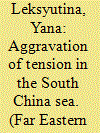

|
|
|
|
|
| Publication |
2011.
|
| Summary/Abstract |
The article analyzes the contradictions in the region of the South China Sea, which have exacerbated recently. The peak of tension was in the first half of 2011, when quite a few serious incidents between China and the Philippines and China and Vietnam took place in the area. The situation becomes more complicated due to the sudden activity of Washington which comes out for the freedom of navigation and wishes to participate in the settlement of conflicts.
|
|
|
|
|
|
|
|
|
|
|
|
|
|
|
|
| 2 |
ID:
079658
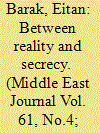

|
|
|
| 3 |
ID:
169289
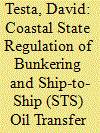

|
|
|
|
|
| Summary/Abstract |
While the United Nations Convention on the Law of the Sea (LOSC) expressly allocates jurisdiction in regard to several activities that are conducted in the exclusive economic zone (EEZ), it does not do so for bunkering and ship-to-ship (STS) oil transfers. This article sheds light on different types of bunkering operations, as well as on the often-overlooked practice of STS oil transfers. It suggests that in the case of bunkering, the allocation of jurisdiction as between coastal and flag states depends on the activity of the vessel being bunkered. In the case of STS oil transfers, it concludes that jurisdictional competence needs to be determined in line with Article 59 of the LOSC. The article also examines relevant state practice and contends that the LOSC’s ambiguity is no license to unfettered coastal state regulation.
|
|
|
|
|
|
|
|
|
|
|
|
|
|
|
|
| 4 |
ID:
148499
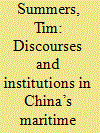

|
|
|
|
|
| Summary/Abstract |
This article examines discourses around China’s maritime disputes. It adopts an English School approach to international order, making use of institutions governing relations between states which are themselves discursive in nature. The article argues that discourse is a particularly important factor in maritime disputes given the ambiguities resulting from historical and ongoing changes in conceptions of maritime space and sovereignty. Further, although these changes have led the institution of international law to play a growing role in questions of maritime sovereignty and jurisdiction, the article argues that the application of these legal frameworks is itself partly discursive and creates ambiguities which inform maritime disputes between key states in East Asia. The article then considers an example of discursive contestation by examining the use of freedom of navigation in the positions taken and practised by the United States and their role in US–China maritime dynamics. It concludes by suggesting that contested discourses around maritime disputes in East Asia are best understood as part of an ongoing and dynamic process of the renegotiation of regional and international order in East Asia.
|
|
|
|
|
|
|
|
|
|
|
|
|
|
|
|
| 5 |
ID:
154807
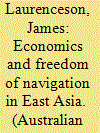

|
|
|
|
|
| Summary/Abstract |
Public calls for a more aggressive regional response to China’s pressing of its territorial claims in the South China Sea are typically couched in terms of the threat posed to freedom of navigation. Yet this invites an obvious question: If freedom of navigation, a vital interest for nearly every country in the region, is at risk, why has the regional response to China’s actions to date been so limited? This article argues that one compelling explanation lies in the economics of freedom of navigation in East Asia. Put simply, the risks of freedom of navigation being impeded are frequently overstated, and a more sober assessment of these risks can reduce the incentive that countries have to take more dramatic action.
|
|
|
|
|
|
|
|
|
|
|
|
|
|
|
|
| 6 |
ID:
146881
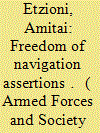

|
|
|
|
|
| Summary/Abstract |
In line with its “Freedom of Navigation” program, the United States conducts “operational assertions” by sending naval vessels to violate what it considers to be the excessive maritime claims of other states. Efforts have been made to legitimate this program to the public and elected officials on both liberal and realist grounds: Freedom of navigation is an important component of the liberal international order while also central to the exercise of U.S. naval power. However, it does not follow that military assertions, which create a security risk and are inconsistent with liberal principles, should take precedence over diplomatic and multilateral steps. Rather, the program has faced little scrutiny to date due to its relative obscurity.
|
|
|
|
|
|
|
|
|
|
|
|
|
|
|
|
| 7 |
ID:
147301


|
|
|
|
|
| Summary/Abstract |
The ‘Freedom of Navigation’ issue has been volatile and often influenced by Sino-US relations in recent years. This problem was rooted in different interpretation of the UNCLOS by China and the US. It has also reflected their different national Interests and maritime strategies. This issue has caused frequent frictions between the two sides and may lead to their future contest for sea power. At the same time, it also urges the both sides to set up new mechanism for confidence building that may help them to manage it in a more rational way.
|
|
|
|
|
|
|
|
|
|
|
|
|
|
|
|
| 8 |
ID:
183263


|
|
|
|
|
| Summary/Abstract |
India and the United States have recently and rapidly consolidated a significant bilateral defence partnership, have a clear appetite for bilateral and quadrilateral maritime cooperation, and appear to share a common commitment to the rules and norms that govern the maritime domain. Yet the US decision to undertake and publicise a freedom-of-navigation operation targeting India in April 2021 again highlighted the two countries’ divergent interpretations of the United Nations Convention on the Law of the Sea (UNCLOS) and of customary international law. This divergence has its origins in differences in Washington’s and New Delhi’s historical engagement with UNCLOS and their preferred means of achieving security and status in the Indo-Pacific. Such differences currently preclude a deep bilateral consensus on maritime order and a common multilateral position within the Quadrilateral Security Dialogue.
|
|
|
|
|
|
|
|
|
|
|
|
|
|
|
|
| 9 |
ID:
159150
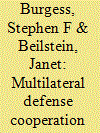

|
|
|
|
|
| Summary/Abstract |
Some U.S. military leaders have asserted that the United States, Japan, Australia, and India and the Republic of Korea are developing multilateral defense cooperation to deter aggression and uphold norms much like North Atlantic Treaty Organization (NATO) has in Europe. Frequent military exercises and China’s threats to freedom of navigation (FoN) and North Korea’s nuclear missiles comprise the motive force for such cooperation. However, cooperation thus far has been trilateral and minimal, given divergent national interests and dispersed geopolitical locations. Cooperation among Japan, Republic of Korea (ROK), and the United States is increasing given the threat, but ROK’s public opinion is divided about Japan. Australia, Japan, and India have increased cooperation with the United States but are reluctant to conduct FoN operations with the United States to challenge China’s expansionism in the South China Sea. If China becomes more aggressive and blocks FoN or seizes territory, development toward an Asian NATO is possible.
|
|
|
|
|
|
|
|
|
|
|
|
|
|
|
|
| 10 |
ID:
158401
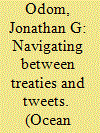

|
|
|
|
|
| Summary/Abstract |
In contemporary international discourse about maritime freedom (e.g., “freedom of navigation”), nations often speak in generalities, but rarely clarify what they mean. To reduce the risk of misunderstanding, nations should navigate their use of language between two purposes simultaneously. First, any discussion should be concise, communicable, and comprehendible. Additionally, nations should also be prepared to dialogue on these matters in greater depth and detail, and any substantive discussion should be faithful to the applicable international law that binds nations. A way to ensure such discourse is meaningful is by following a three-step process of labeling, framing, and applying. This article details this approach.
|
|
|
|
|
|
|
|
|
|
|
|
|
|
|
|
| 11 |
ID:
110843
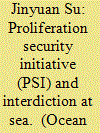

|
|
|
|
|
| Publication |
2012.
|
| Summary/Abstract |
The Proliferation Security Initiative has been surrounded by questions and criticisms pertaining to its legality since its inception. However, after nearly a decade of existence and development, it appears now that the actions conducted pursuant to the PSI have, by and large, been consistent with the principles of flag state jurisdiction, the nonuse of force, and sovereign equality and have not substantially impeded states' maritime rights in the territorial sea, contiguous zone, exclusive economic zone, or on the high seas.
|
|
|
|
|
|
|
|
|
|
|
|
|
|
|
|
| 12 |
ID:
124202
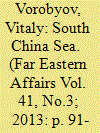

|
|
|
|
|
| Publication |
2013.
|
| Summary/Abstract |
The situation in the South China Sea has lately been acquiring the trappings of a Pacific-scale risk area. So far, though, no one ventures to cross the red line. All signs are that it is more than the territorial disputes between China and several Southeast Asian member countries of ASEAN. In more than one sense, the South China Sea problem is an issue reverberating beyond the regional borders.
|
|
|
|
|
|
|
|
|
|
|
|
|
|
|
|
| 13 |
ID:
165873
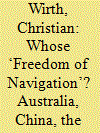

|
|
|
|
|
| Summary/Abstract |
The so-called freedom of navigation through the Malacca straits and the South China Sea, some of the world’s busiest trade routes, has long been of concern to scholars and practitioners of international politics in the region. Increasing tensions around territorial disputes recently propelled the issue to the forefront of global foreign and security policy making. Yet, despite the frequent invocation of threats to the ‘freedom of navigation’ for the justification of military measures to protect the ‘liberal rules-based order’, the substance of this rule or norm remains ambiguous and the nature of the threatened order unclear. Located at the confluence of the Indian and Pacific Oceans, Australian discourses represent a suitable case for clarifying both. Starting from the original provisions on navigational regimes in international law, this study analyses the meanings that officials, think tank analysts and academics have been attributing to the freedom of navigation and contextualize them in the evolving debate about order. Focusing on political rather than legal discourses, it finds that concerns with the freedom of navigation are largely unrelated to the safety of maritime transport. Instead, they serve as proxy for an increasingly static imagination of international order – written backward in time – to be secured.
|
|
|
|
|
|
|
|
|
|
|
|
|
|
|
|
|
|
|
|
|